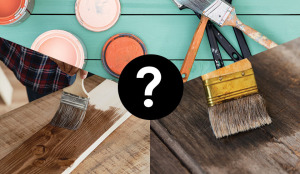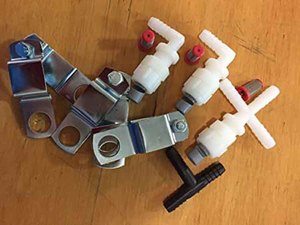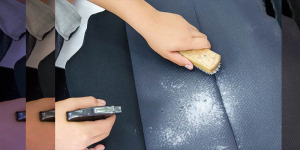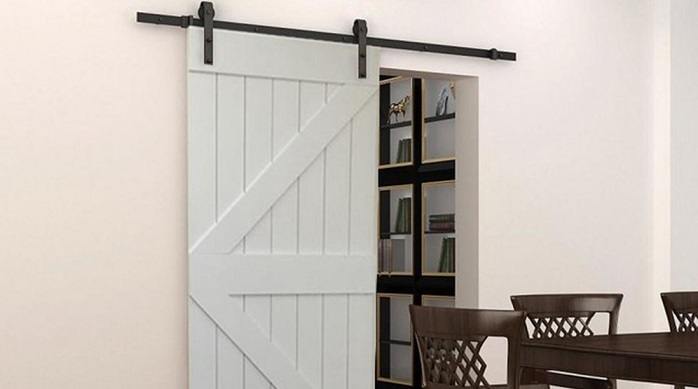Spiders building webs around windows and doors is a common issue, but an unsightly and annoying one. In this post, Sara shares tip and steps for stopping spiders from nesting around your windows and doors, whether inside or out.
If anyone tells you they don’t have spiders in their home, then they are lying or living in quarantine. Everyone has run-ins with spiders, and they are persistent little fellas. For the most part, we deal with it and live alongside them, albeit reluctantly. Sometimes, it gets out of control and we grab the broom to brush them away, or vacuum them up. But within 2 weeks, there they are again as though they’d never left. Argh!

While we have mostly learnt to live with them, after all spiders play an important role keeping insect populations down and acting as food for birds, there are a few spots around our home where we definitely want them gone. One of these spots is indoors around the skylight in our bathroom, and the other is around our front screen door where my young daughters fingers could touch when she opens the door. To be honest, I’m not sure if these spiders are poisonous (I think they might be mildly poisonous) but they sure as hell are scary looking:
In this post I share my research for getting rid of spiders from around windows and doors, and other spots around the home. I also show a trick that I’ve put in place to try and stop spiders building webs and nesting in the most problematic areas. First, I’ll share all the options, then show you what I’ve done.
Outdoors
Stop spiders building webs around windows and doors outdoors
Preventing spiders from building webs and nests outside your home is trickier than the inside, simply for the fact that it is exposed to the elements, so you can’t physically keep them ‘out’ of anywhere. Not to mention, patios, screen doors and eaves provide nice homes for critters as they are protected from rain, wind and sun. However, there are still some things we can do to deter spiders from these spots.
#1 Clean Your Home’s Exterior Regularly
Running into an unexpected spiderweb on your front porch or inside your home can be an overwhelming experience for anyone. Walking into spider webs is not something you ever get used to, and is even more embarrassing when it happens to your guests.
While many of us put a lot of effort into keeping our houses clean, spiders still make their way inside to build webs. Nevertheless, most people don’t go looking for spiderwebs to clean, rather they merely clean what they can see. One of the best ways to prevent spiderwebs from forming outside is to clean all of the nooks and crannies on a regular basis, including the hard-to-reach and low-traffic areas around the home.
#2 Keep the Yard Clean
Don’t forget to also clean up any clutter in the yard. As always, it is important to keep the yard clean at all times. Not only can clutter attract spiders into the yard, but dead leaves, compost bins, overgrown lawns, and even clogged drains are the perfect breeding ground for creepy crawlies. Spiders just love moving into piles of junk in the yard including wood, as well as old toys, neglected furniture and unused barbeques.
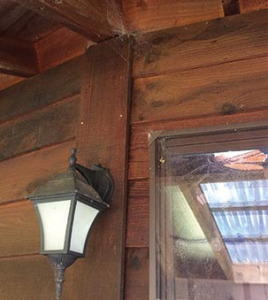
The longer that something stays in the yard, the greater chance that it will become home to a spider or other insects. It only takes a few spiders to take up residence in your yard before they finally start making their way inside. Not only does keeping your yard clean make it look more presentable, but it limits the number of hiding spaces for spiders and other insects.
#3 Adjust Outdoor Lighting
If you haven’t already noticed, spiders love building their webs right next to outdoor lighting. The reason for this is that their prey which includes ants, moths, and other winged insects of the night, are attracted to the lights. They naturally want to build their webs as close to the fixtures as possible in order to improve their chances of catching prey.
Having the lights in the yard is an important security measure for most homeowners, which is why it is always best to make use of a smart fixture that will automatically turn the light on and off on a regular basis or as needed. This will prevent winged insects from congregating in the yard, and likewise, prevent spiders from building their webs.
#4 Replace Wooden Storage Boxes with Plastic
Spiders are attracted to wood storage bins, but they really don’t like plastic. If you are like most homeowners or renters, then chances are you store a lot of your items in the garage in cardboard or wood boxes. Cardboard and would both attract spiders, so it’s important to swap them out with plastic storage boxes as soon as possible. They are more durable and airtight, which makes them perfect for preventing spiders from moving in.
Indoors
Stop spiders building webs around windows and doors indoors
#1 Clean Inside Your Home Regularly
Alright, alright, another lecture about keeping our house clean. We get it… to keep insects, bugs and spiders out we need to keep our homes immaculately clean. If you’ve seen our house, you’ll know that clean is not something we do all that well, which you’ve probably guessed since we have such big spider problems! Not for lack of trying, but we both work day jobs, have a young child, and run a hobby farm… so time is not something we have much of. And we know many people are in the similar boat. We want to keep our houses clean, but to do that takes time that we don’t often have.
However, in saying that, cleaning the inside of your home on a regular basis is really quite effective in keeping spiders out. After all, a messy, unkempt home attracts insects of all sorts such as flies, cockroaches and various beetles. Spiders eat these smaller insects on a regular basis, and are attracted to areas that are rarely cleaned since they are filled with the prey they can feed upon. Don’t just take our word for it, Expert Home Report agrees, if your home is not clean, then insects and spiders both can move in and quickly multiply.
#2 Check for Eggs
Spiders love laying eggs everywhere, and chances are you have probably come across their egg pods from time to time. Many homeowners and renters simply ignore them, but it is important to vacuum them up as soon you find them. Check areas around your house interior, cupboards, garage, patio, front porch, veranda, or any dark corner with lots of humidity for spider eggs. In our house, they appear in the bathroom, near the window and skylight. If you find egg sacs vacuum them up immediately in order to assure that they do not hatch and multiply in and around your home.
#3 Trap Spiders and Release Them
While there are a number of species of spiders that are extremely poisonous, most household spiders are not. Rather than killing the spider when you find it, you should make an attempt to trap it and release it into the wild, far away from the house. If however, you come across a poisonous spider like a recluse or a black widow (or, here in Australia, a red back spider), then it is important to act with extra caution or reach out to a professional to have it trapped and removed properly. Remember that the longer a spider is in your home, the greater opportunity it has to reproduce and multiply.
#4 Check Your Window Seals
Naturally, spiders are going to find it easier to get in and build webs around gaps and worn out seals. An example is my studio where the seals are almost non-existent, and as a result it is like spider city around the window. Not just spiders, but also other insects make their way in through these gaps. In old houses such as ours, gaps around window frames are not uncommon, as things move and shift over time.
Clean up the webs and nests to start with using a vacuum, and give it a good clean with some soapy water. Then look around the window frames. If you find gaps around the frame, use some gap filler such as No More Gaps or wood putty to fill in the spaces. Allow it to cure, then rub the frames with a little citrus oil or spray them with homemade spray to make it unattractive to those little critters.
#5 Use Homemade Insect and Spider Sprays
Like most insects, spiders do not like certain natural substances that can be found at any local hardware store or home supply store. When you clean the interior and exterior of a home, in places where the spiders are more likely to build their webs, it’s important to use homemade sprays as a means of detracting the spiders from moving in. The simplest spray a homeowner or renter can use is regular vinegar and water.
Natural insect and spider repellants include:
- Vinegar and water (50/50 mix)
- Citrus oil
- Mint essential oil
- Tea tree essential oil
- Eucalyptus essential oil
- Lavender essential oil
- Rose essential oil
Try to switch it up from time to time because some insects are known to adapt to the scent over time.
Mint Oils
3 drops per 1 Gallon of Water
Spiders hate being around mint oils. It only takes about 3 drops of essential oils per gallon of water in order to create the perfect household spray. It’s important not to use too much of the mint oil, as it is a very powerful oil that can often make humans uncomfortable. When used in just the right amount, it works as a powerful deterrent against not just spiders, but also a number of different types of insects and other pests.
Citrus Oils
Another natural insect repellant uses the essential oils of various citrus fruits. We’re talking about the oils here, so don’t just go spraying the fruit juice around.
Instead take the peels of highly acidic citrus such as lemons, grapefruits and limes, scratch them with a fork to release their oils, then rub them along the windowsills. Bending the peels will cause the oil to spray out, so alternatively you can bend and spray the oil onto the areas you need, then rub it around with your fingers, pastry brush or a tissue.
Citrus-scented candles are also effective, but are very pungent and may repel humans as well, so probably not something you want to burn all the time! I personally find that citrus candles burn with a dirty black smoke that can coat surfaces, so they are best used outdoors.
Tea Tree, Eucalyptus, Lavender and Rose Oils
15-20 drops per 1 Gallon of Water
Other popular essential oils that can be used to detract spiders and other insects from coming onto your yard include tea tree oil, eucalyptus oil, lavender oil, as well as rose oil. Because they are not nearly as strong as mint essential oils, you will need anywhere from 15 to 20 drops per gallon of water in order to make a spray.
Our Steps for Stopping Spiders from Building Webs
Here I go over the steps and methods I took to deter spiders from building webs. Since I have just implemented them I can’t comment on success yet, but this is an example of how you could combine different methods to keep your spider populations down.
#1 The Broom
My first mission was to get rid of existing nests and webs. And for that, I started with the broom.
Wear shoes, get a long-handled broom and be prepared to get some spiders running around from the shock of having their homes ripped down. If they don’t run around, it probably means they are hiding in the crevices, so you’ll need to get them out. After the broom, I ran a shop vac around the windows and doors, to suck out any hiding spiders.
Alternatively, if it’s outdoors, you could use the garden hose and spray them, or indoors use a vacuum to suck them out. I personally don’t like chemical insect sprays, but I’m not here to judge. To be honest, I don’t really like the idea of using a vacuum either, because of the possibility of having living spiders inside my vacuum cleaner, although I’m not sure if they would survive the journey; I can’t say I’ve been game enough to open the vacuum afterwards to find out. Do whatever suits you to get the spiders out.
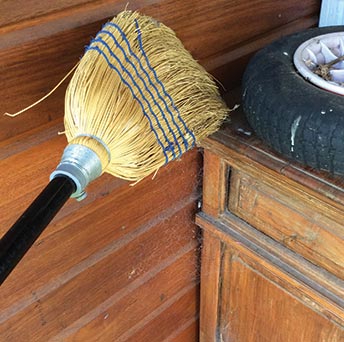
#2 Gap Filler
As mentioned earlier. our house is quite old and we have large gaps around our windows. So, the next logical step was to seal some of these gaps to prevent spiders getting inside, in the first place. We use No More Gaps Caulk by Selleys here in Australia – not sure if the brand is available internationally, but there certainly would be an equivalent. Just follow the instructions to fill any gaps with caulk or wood putty and let it cure for a few days. I only did this in indoor areas where spider webs were a problem, not outdoors.
#3 Spray with Vinegar Water
Next, I thoroughly sprayed the spider webby areas with a 50/50 mix of regular white vinegar with water. I then allowed it to dry overnight. My thinking with this step was to draw out or kill any remaining spiders or other insects that could still be lurking in any gaps, before moving to the next step.
#4 Home Made Spider Paste
Here we come to my own invention. After reading about homemade insect sprays I thought, ok, that’s well and good but sprays don’t last very long. You need to keep applying spray, and knowing me I’d probably forget to do that. Instead, I wanted something along the lines of a moth ball, which would emit smells 24/7 to repel spiders. However, the shape of window and door frames makes it difficult to put an object like a moth ball in.
After considering and trying a few options, I remembered PVA glue. In particularly, the properties of PVA glue to dry clear and be peeled off most surfaces quite easily.
I made a paste using PVA glue and peppermint essential oil. The ratio is not exact, but I made it quite strong, around 10mL PVA mixed with 15 drops of mint essential oil. I used mint oil, but any spider repelling substance should work in theory, since the PVA glue is just the carrier you will use to stick it to the frame.

Then, paint the paste onto the window frame or other problematic area with a small paintbrush. I used it on metal because I know it will peel off easily, but if you are using it on other surfaces such as wood, please test it in an inconspicuous area first to ensure it doesn’t damage or discolor the surface.
Allow it to dry. I used a hair dryer to hasten the drying. In the picture it is white, but PVA glue dries clear, so it will be invisible when dry.
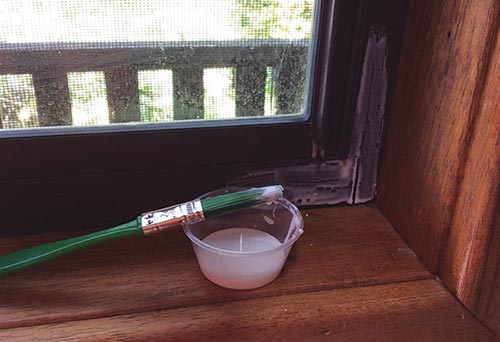
While PVA glue is water-based, I didn’t have any issue mixing the oil into it, probably because it was such a small quantity. I was also concerned the PVA glue might somehow bind the oil in such a way that it didn’t smell, but that was not the case; once it was mixed and even dried, the mint smell remained strong.
The great thing about PVA glue on smooth surfaces like metal or plastic, is that if you decide you don’t want it anymore, you can simply peel it off. Easy.
I have only just applied this spider paste recently, so I am yet to see how the paste works in the long term to repel spiders. I’ll update this post once I find out.
Final Thoughts on Keeping Spiders Out
You can probably now see that there is no quick fix, or even a single fix, for keeping spiders out of your windows and doors.
As for the indoors, in my case, a combination of fixing the gaps around the windows and doors is most effective, to make it difficult for them to come in in the first place. Also, not letting small webs develop into huge webs with eggs, which then burst into a family of potentially hundreds of spiders in your home is really important.
Cleaning is annoying, but running around the frames of the doors and windows with a portable vacuum or a broom every now and then, isn’t a big deal. It’s just about getting into the habit of it, and being aware of when webs start developing.
Outdoors areas are of course more difficult to keep spiders away from, particularly around the front door where the porch light acts like a party zone for insects at night. This of course then brings in spiders looking for a place to live near those tasty insects.
Realistically, when dealing with the outdoors, you will probably need to pick your fights. For example, leave the spiders around the light alone, but work on just keeping them off the screen door or places where you are likely to touch or run into their webs. And realize that even though this is your property, we live in a world where we need to co-exist with wildlife. Spiders included.
Now that you’ve dealt with the spiders, try these tricks to stop birds perching in unwanted areas and keeping rats out of your vegetable garden.
Cheers,
Sara
Author
-

Hey, I’m Sara, co-owner of NestKoo! I’m a graphic designer and professionally trained fine artist, with a Bachelor of Arts (Fine Art) majoring in Painting. I love being close to nature, sustainable living and bringing new life to old things. My specialty in NestKoo is DIY house painting, upholstery and furniture upcycling, where I bring my skills in fine art painting and contemporary design together into a practical home DIY context.
View all posts


